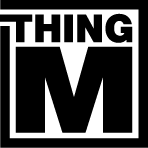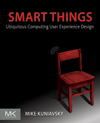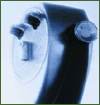I spoke last night at Berkeley's School of Information Future of Interaction Design lecture series, presenting the "Sketching Smart Things" talk I gave at BayCHI last month and at CHIFOO the month before. I'm evolving this talk, rather than doing every talk from scratch. There's about 80% overlap with the previous talks, though this time around I've added several slides to explain the origin of the Information Shadow idea by citing Tom Coates' and Ulla-Maaria Mutanen's work, and I've referenced Bag, Borrow or Steal when talking about how digital technology is shifting the nature of everyday objects into subscription services.
You can download the presentation with all the text as a 900K PDF.

(image by MGChan, found on Flickr)
That last reference shows my current interest in the way that digital networked technologies allow for objects to shift from "buy and store" model to a "rent and share" subscription model. Bag, Borrow or Steal, City Carshare and timeshared condos (thanks to Nicholas Nova for reminding me of this) are all occasional use/high price products that technology has changed the ownership model for. What's a high price niche functionality today becomes commodity functionality eventually. Netflix has done it for DVDs. In one of Bruce Sterling's original Viridian speeches from 1999, he brings it all the way don to the most commodified of tools, the hammer:
If all your possessions are network peripherals, then you have a possible LINUX model for objects in the real world. In this world, I don't buy a hammer. What I really want to own is the hammering functionality. I might as well share the hammer with my neighbor == he can't steal it, and if he breaks it, I'll know immediately. A modern hammer in this world comes built around a chip, with a set of strain gauges that determine if it is worn or broke or abused. Let's network that hammer.
Berkeley's famous Tool Lending Library did a low-tech version (the subscription price for it is the cost of owning a house in Berkeley), and Ford, DeWalt and ThingMagic are tantalizingly close with their Tool Link product:
The innovative Ford Work Solutions Tool Link from DeWalt uses RFID technology to track what's in your cargo box and what isn't. Checking Tool Link before heading out to a job site ensures all tools you need are on hand. At the end of the workday, Tool Link guarantees all the gear used at a job site is back onboard.
The Ford version is a kind of personal inventory control system, but once every tool has an embedded RFID tag in it, you can start doing all kinds of things, including the kind of subscription-based resource sharing that Sterling alluded to. Soon, though, more occasional-use products will become dotted outlines that get filled in as we need them.
[Update: Treehugger has an article that says that services like Bag Borrow or Steal are Product Service Systems by the EU. Their definition is "in essence they are a means, by which we get what we want, without needing to own the product that provides that service." I think that the term, and its PSS acronym, sounds too abstract and generic and that the idea would spread if it was called something more informative and evocative--I dunno, "library" for nonprofit ones and maybe something like "thingshare" (riffing off of "carshare" and "timeshare") for the for-profit general class.]
[Update: Phil points to Jeremy Rifkin's Age of Access as a book-length discussion of some of these ideas with the core thesis being "Property [in the age of networked information] continues to exist, but is far less likely to be exchanged in markets. Instead, suppliers hold onto property in the new economy and lease, rent, charge an admission fee, subscription, or membership dues for its short-term use." I haven't read it--it's on order now--but like much of Rifkin's work, it seems like there's an essence of truth to the idea even though the presentation is hyped.]



